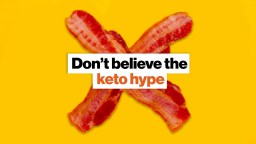vegetarian
“Our mission is to completely replace the use of animals as a food technology by 2035,” said Patrick O. Brown at the 2020 Web Summit.
Vegans and vegetarians often have nutrient deficiencies and lower BMI, which can increase the risk of fractures.
New research suggests some men identify with a new form of masculinity that values authenticity, domesticity, and holistic self-awareness.
We all know somebody who avoids meat. These schools of thought suggest those people are onto something.
You cannot live on steak and avocados alone, says Jillian Michaels, in this divisive video.
▸
4 min
—
with
Could vegetarianism actually lead to a lower quality of life?
The McVegan is a real thing… in a tiny small town test market, that is. But what are customers saying? And will it be available to everyone soon?
A new study shows how one dietary change in the U.S. could make a 46%-plus dent in greenhouse gas reductions.
Methane gases from livestock production is contributing to the acceleration of global warming. Is a plant-based diet a smart way for individuals to curb the effects of climate change?
▸
3 min
—
with
They may have even kissed our ancestors.










